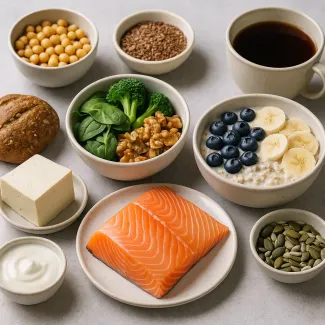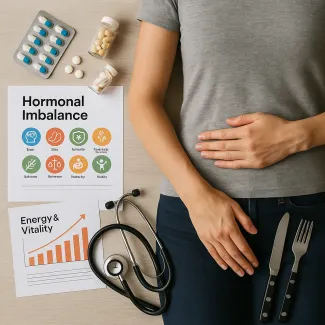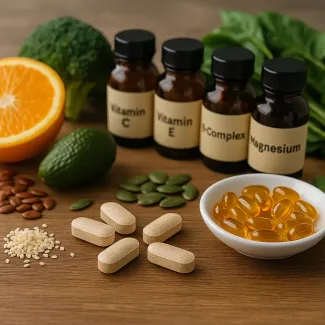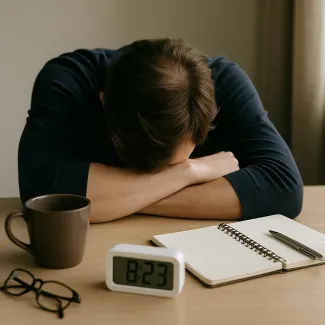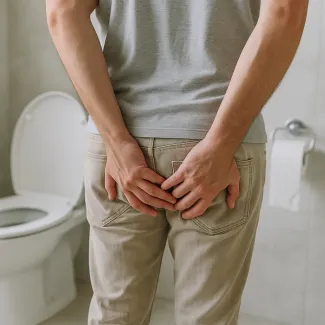
Natural Ways to Ease Discomfort and Prevent Hemorrhoids Long-Term
Gentle solutions for lasting relief and better daily well-being
Hemorrhoids are a common health issue that affects millions of people globally, yet they remain one of the most uncomfortable and rarely discussed problems. They can cause pain, itching, swelling, bleeding, and even make sitting or going to the bathroom difficult. But despite how uncomfortable they are, hemorrhoids are treatable and preventable—especially when approached with a combination of natural remedies, lifestyle changes, and preventive care.
Understanding what hemorrhoids are, what causes them, and how to manage them without invasive treatments is crucial. This article dives deep into natural, practical, and long-term strategies to recognize symptoms early, relieve discomfort, and promote better overall health.
What are hemorrhoids and why do they occur?
Hemorrhoids are swollen veins located in the lower rectum or anus. Depending on their position, they can be either internal (inside the rectum) or external (under the skin around the anus). While internal hemorrhoids may go unnoticed, external ones often cause pain, itching, and visible swelling.
The causes of hemorrhoids vary, but the most common triggers include:
- Chronic constipation or diarrhea
- Straining during bowel movements
- Sitting for long periods, especially on the toilet
- A low-fiber diet
- Obesity and sedentary lifestyle
- Pregnancy, due to increased pressure in the pelvic region
While hemorrhoids can happen at any age, they become more prevalent after age 30, when lifestyle, metabolism, and digestive patterns begin to shift.
Recognizing early signs of hemorrhoids
Early recognition of hemorrhoids allows for faster and more effective natural treatment. Common symptoms include:
- Itching or irritation in the anal area
- Pain or discomfort when sitting or after bowel movements
- Swelling around the anus
- Bleeding, especially during bowel movements (bright red blood on the toilet paper)
- Lumps or swelling near the anus, which may feel tender
Even mild symptoms should not be ignored, especially if they recur frequently. Addressing early signs with gentle, natural interventions helps prevent complications such as thrombosed hemorrhoids or prolapse.
Adjusting your diet to reduce and prevent flare-ups
One of the most effective ways to prevent and manage hemorrhoids naturally is through a high-fiber diet. Fiber helps soften stools, reducing the need to strain during bowel movements.
Focus on adding these fiber-rich foods to your meals:
- Whole grains, such as oats, quinoa, barley, and brown rice
- Fresh fruits, especially pears, apples (with skin), berries, and bananas
- Vegetables like spinach, kale, carrots, and broccoli
- Legumes, including lentils, beans, and chickpeas
- Nuts and seeds, such as chia seeds and flaxseeds
In addition, hydration is critical. Drinking plenty of water throughout the day helps fiber do its job and keeps stools soft and easy to pass. Avoiding processed foods, refined grains, and excessive sugar is equally important, as these can worsen constipation and irritation.
Natural home remedies for immediate relief
While diet plays a long-term role, certain home remedies provide faster relief from acute symptoms:
- Warm sitz baths: Soaking the anal area in warm water for 15–20 minutes a few times a day helps reduce inflammation and promote healing.
- Cold compresses: Applying an ice pack wrapped in a cloth can reduce swelling and numb pain.
- Witch hazel: Known for its anti-inflammatory and astringent properties, it can be applied using pads or wipes to soothe irritation and shrink tissue.
- Aloe vera gel: Naturally cooling and soothing, aloe vera can help relieve burning and itching.
- Coconut oil: Its antimicrobial and soothing properties may help relieve discomfort and support skin healing.
Make sure to use pure, unscented versions of these remedies to avoid further irritation.
Support your digestion for long-term hemorrhoid prevention
Good digestive health is key to preventing hemorrhoids from recurring. This involves more than just eating fiber; it's about building habits that support regular, strain-free bowel movements:
- Don’t delay bowel movements: Ignoring the urge can lead to harder stools and increased straining.
- Use a footstool when on the toilet: Elevating your knees can help align your body for easier elimination.
- Avoid prolonged sitting: Especially on the toilet or in one position for too long—this increases pressure on anal veins.
- Stay physically active: Regular movement boosts intestinal activity and helps regulate digestion.
Adding probiotic-rich foods like yogurt, kefir, sauerkraut, and kimchi can also enhance gut health and stool regularity.
Understanding the role of stress in digestive and vascular health
Chronic stress not only affects your mental health—it impacts digestive efficiency and vascular tone, both of which are critical in the development and severity of hemorrhoids.
High stress levels can slow digestion, increase inflammation, and trigger unhealthy habits like poor diet, dehydration, or irregular bathroom routines.
Incorporating stress-reduction techniques such as mindfulness, breathing exercises, gentle yoga, or simply spending time in nature can significantly reduce flare-ups and improve your body's natural healing capacity.
Choosing the right physical activity to reduce pressure
Regular physical activity helps prevent venous congestion, reduces weight gain, and improves bowel regularity—but not all exercises are created equal when dealing with hemorrhoids.
Beneficial exercises include:
- Walking or light jogging
- Swimming
- Gentle yoga and stretching
- Pelvic floor exercises (Kegels), especially useful post-pregnancy or with sedentary jobs
Avoid high-intensity workouts that involve heavy lifting, straining, or prolonged sitting on hard surfaces, as these can worsen symptoms.
Understanding pregnancy-related hemorrhoids
Hemorrhoids are common during pregnancy, especially in the third trimester and postpartum period. Hormonal changes, increased blood volume, and pressure from the growing uterus all contribute to their development.
To reduce the risk during pregnancy:
- Maintain a balanced diet high in fiber
- Hydrate adequately
- Avoid standing or sitting for long periods
- Sleep on your side to reduce pressure on pelvic veins
- Do daily gentle movement, such as prenatal yoga or walks
After childbirth, postpartum care should include softening stools, taking warm baths, and using soothing creams or pads that are safe for breastfeeding mothers.
When to seek medical attention
While natural approaches are highly effective for mild to moderate hemorrhoids, it’s important to know when professional care is needed. Seek medical advice if you experience:
- Persistent or heavy bleeding
- Severe pain or swelling
- Signs of infection, like fever or pus
- Hemorrhoids that protrude and don’t return inside
- No improvement after several weeks of home care
In some cases, treatments such as rubber band ligation, sclerotherapy, or minor surgical procedures may be recommended—but these are often preventable with consistent natural care.
Natural supplements and herbs that may help
Several natural ingredients have traditionally been used to strengthen blood vessels, reduce inflammation, and support circulatory health. These include:
- Horse chestnut extract: Supports venous tone and reduces swelling.
- Butcher’s broom: Often used for circulatory conditions, including hemorrhoids.
- Diosmin and hesperidin: Bioflavonoids that improve vascular tone and reduce symptoms.
- Psyllium husk: A gentle, bulk-forming fiber that promotes softer stools.
- Magnesium citrate: Can support bowel regularity in case of constipation.
Always consult with a healthcare provider before starting supplements, especially if pregnant, breastfeeding, or on medication.
Daily habits that prevent recurrence
Maintaining hemorrhoid-free health goes beyond treatment—it requires daily mindful routines. Incorporate these habits:
- Drink at least 2 liters of water per day
- Move your body regularly
- Choose whole foods over processed ones
- Keep bathroom visits short and unstrained
- Use soft, unscented toilet paper or wipes
- Maintain a healthy weight to reduce pressure on pelvic veins
A hemorrhoid-friendly lifestyle is often gentler on the whole body, benefiting digestion, circulation, and general energy levels.
Skin care and hygiene around the anal area
Good hygiene plays a role in both comfort and prevention. Clean the anal area gently but thoroughly after each bowel movement. Avoid aggressive wiping, soaps with fragrance, or alcohol-based products, which can irritate sensitive tissue.
Opt for:
- Unscented baby wipes
- Warm water rinsing with a handheld bidet or peri bottle
- Patting dry instead of rubbing
- Wearing loose, breathable underwear made of natural fibers
Proper hygiene minimizes risk of secondary infections and supports faster recovery.
Managing hemorrhoids with aging and lifestyle transitions
As we age, the risks of hemorrhoids increase due to slower metabolism, decreased mobility, and weakening connective tissues. Those over 50 should be particularly proactive in supporting bowel health, hydration, and vascular integrity.
Key strategies include:
- Staying active daily, even if just short walks
- Adopting a mediterranean-style diet, high in fiber and healthy fats
- Using stool softeners when necessary
- Getting regular digestive health check-ups
Adaptation is key—adjusting your habits to your age and activity level helps keep symptoms under control.
Supporting your microbiome for better digestion
An often-overlooked element in hemorrhoid prevention is gut microbiota balance. A diverse, healthy gut biome supports smoother digestion, less bloating, and better stool consistency.
Support your microbiome by:
- Eating a variety of plant-based foods
- Including fermented foods regularly
- Avoiding overuse of antibiotics
- Reducing intake of refined sugar and alcohol
When digestion flows smoothly, the chances of developing hemorrhoids decrease significantly.
Avoiding common mistakes that worsen hemorrhoids
Many people unknowingly worsen their condition by sticking to bad habits or using the wrong remedies. Be cautious of:
- Using harsh laxatives instead of fiber-based ones
- Over-wiping with dry toilet paper
- Ignoring hydration during high-fiber diets
- Using numbing creams long-term, which can thin the skin
- Holding in bowel movements out of habit or convenience
Awareness of these factors and correcting them early makes natural healing more effective and prevents recurrence.
How hemorrhoids affect emotional and social well-being
Though often dismissed as a physical issue, hemorrhoids can take a toll on mental health and quality of life. Discomfort can affect sleep, focus, physical intimacy, and even social outings due to anxiety about symptoms.
Creating a compassionate, shame-free approach to healing is essential. Talking to a trusted medical provider, making lifestyle changes, and learning to listen to your body can help reduce emotional stress connected to this common condition.
Integrating holistic hemorrhoid care into your wellness routine
True wellness includes caring for every aspect of the body—digestion, circulation, skin, and mood. Hemorrhoid management can become a natural part of your self-care regimen, just like brushing your teeth or hydrating.
Integrating hemorrhoid prevention into your lifestyle reinforces other positive habits and supports overall better health, especially for adults over 30 who are navigating digestive changes, hormonal shifts, and lifestyle transitions.

